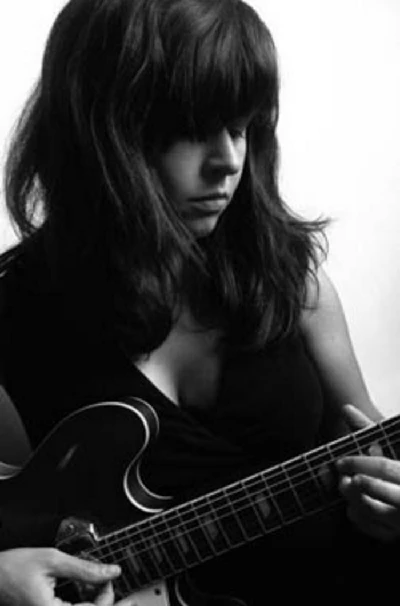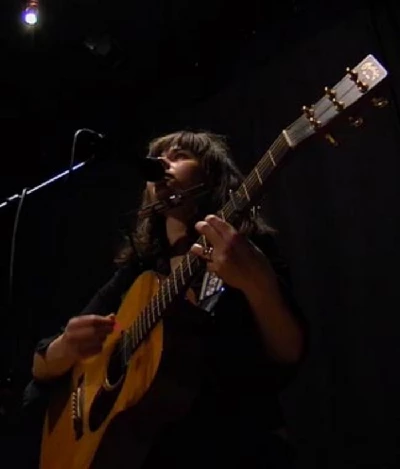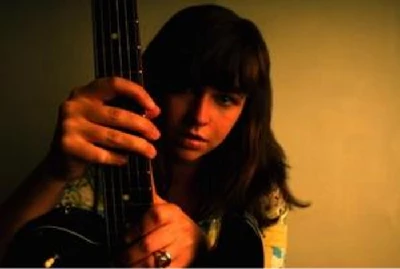published: 16 /
6 /
2007

Singer songwriter Polly Paulusma's just released second album, 'Fingers and Thumbs', has in contrast to her delicate debut album, 'Scissors in My Pocket', a hard rocking sound. Ben Howarth talks to the rising singer-songwriter about her new record
Article
The first thing that will strike anyone listening to Polly Paulusma’s new album is that, to put it sharply, it rocks. There are loud, thumping drumbeats, grainy guitars and thick basslines. That comes as quite a surprise, given that her first album was a delicate album, predominately comprising of noticeably Joni Mitchell inspired ballads.
I met Polly a couple of hours before she was due on stage at the Luminaire to play a "launch" gig. The new album had come out that very day, and having followed what seemed a protracted and often awkward process of writing and recording the album, it must have come as a release.
Paulusma is far from the typical character found playing a north London indie club on a Monday night. Oxbridge educated, she worked at the BBC for a while, and had begun a PHD at Cambridge when she decided that music was what she really wanted to do. She appears on stage wearing an elegant red dress.
Her literary ambitions have probably been overegged by the media. She did acquire an agent, but there isn’t an unpublished novel collecting dust in the draw. It also gives what seems like the wrong impression that music was a final roll of the dice for a flightly middle class girl who couldn’t face 9 to 5 work. Music was, and clearly is, a passion - and it's surprising mostly that it took her this long to realize it.
Her first album, ‘Scissors In My Pocket’ was released to positive reviews, and as far as I know healthy sales. I liked it, almost in spite of myself. Paulusma made no attempt to undersell herself. Though the album had been recorded in a garden shed, it was resolutely ‘tasteful’. Michael Parkinson played it on his radio show, and it would have been inconceivable for Peel to have played it on his. ‘Fingers and Thumbs’ is louder, more strident but it is still ‘mainstream’.
If we were to be very broad, you could draw a line between the James Blunt/KT Tunstall and Joanna Newsome/Devendra Banhart schools of singer-songwriters. Where would you put Paulusma? She is certainly not soppy, and her songs are far from dull. But they are classically constructed, and conventionally catchy. Nonetheless, I like the new album.
What sets her apart from Dido is that she is an articulate lyricist. Much of the album deals with the theme of a struggle to conceive and start a family. Her first child has recently been born, which gives a happy ending to what sounds like difficult times. The words are defiantly devoid of cliché, at every step.
‘Fingers and Thumbs’ was recorded, once the recordings finally began, in just three weeks. But those recordings came at the end of a long process. The first thing Polly told me was that, now the release date had arrived, she was "relieved". She accepted that finishing an album was something that would never have come easily or quickly, and indeed she had 40 songs written which were whittled down to ten for the final product. But nevertheless, it had been a "long process".
Perhaps, if Polly had not found Ken Nelson, the album would still be in her head and not on my stereo. She told me that he made all the difference. "He had a great attitude", she explained. "His approach was one of enabling us to record effectively. He was excellent to work with, and definitely made all the difference".
The other factor was "money". "We recorded the whole thing in three weeks", Polly explained. "You couldn’t do that if there wasn’t the money to get a great studio and a great producer". The bass and drums were recorded almost immediately, which is remarkable. The drums in particular sound excellent. It is rare on a record to capture what drumming actually sounds like before it has gone through microphones and decks. Ken Nelson, somehow, has done just that. So, though it was a more expensive album, the effect to the listener is one of a band playing live. Arguably, this is the making of fingers and thumbs.
Having "rehearsed like -----", Polly and her two backing musicians, went in to the studio for two stints. Having been told by "everybody" that she would maybe record two songs, the first session yielded seven of the tracks that ended up on the record. "I always put myself under pressure", Polly explains, but nevertheless this was clearly an efficient working process. The album gels together, but when you consider this, it is hardly surprising.
Polly summed up the creation of the new album when she said that, "the creative side was really easy, but the pragmatics were really difficult". Finding the right producer may have yielded a great album, but it was an extensive and exhaustive process at a time when Polly had other, weightier concerns - which we hear about on the album. But having arrived in the studio, "I was lost in the music. I really enjoyed playing with the band".
So why the different sound. Well, it has been three years. Few bands admit this, but Polly openly said that it was because the bands she had been listening to had changed. "When I recorded my first album, I listened to lots of singer songwriters like Joni Mitchell, but now I have been listening to bands like Kings of Leon and the Yeah Yeah Yeahs, and to lots of Neil Young". Refreshing honesty.
Furthermore, when I asked if she felt any concern that her ‘literary’ reputation caused people to over-criticize her music, she seemed genuinely unbothered. There was no PR styled deflection of my question, but simply, "that’s something other people can worry about!".
Polly asserted that she was as enthusiastic now as she had ever been - a cynic might say that being married with kids would make music more of a hobby than a life‘s work, but this is clearly not going to be the case. She praised her label, One Little Indian which though people had come and gone over time, was "like a family. I certainly haven’t thought about working with anyone else, so I hope I’ll be able to keep working with them".
She has a festival date coming up, and though there is no further tour planned at the time of writing, her obvious enthusiasm for some of the venues she had appeared at, including the Luminaire which she described as amazing both to me and to the audience later that night. She has also learnt sound engineering at a training course, and had begun producing other bands, a further demonstration that music is not just a hobby.
There are a lot of singer-songwriters around - and only so many can be famous. The Luminaire was busy, but not packed. Her music is probably not stylized enough to get her too many lead features in broadsheet newspapers, but I also got the impression that she had found an audience that don’t plan to abandon her.
But I recommend the album. I’ve played it, just as I did with her first, an awful lot since I first heard it - it is especially good for the early morning bundle on the Victoria Line. I enjoyed the interview, and I really enjoyed the gig - where the songs from the album I’d been listening to came alive.
Picture Gallery:-

